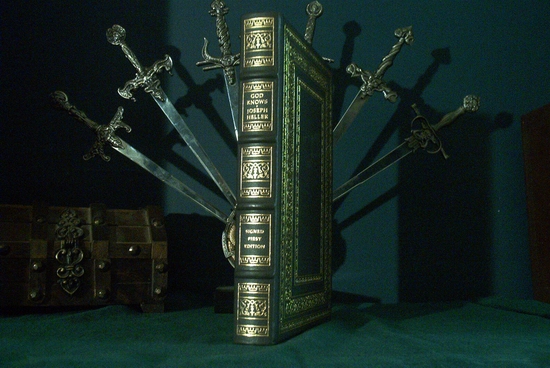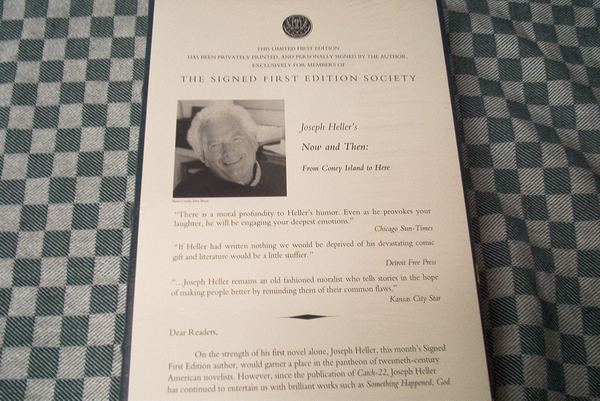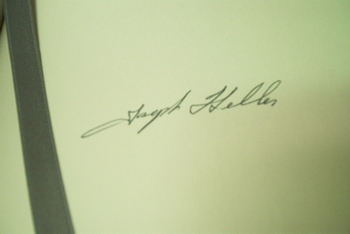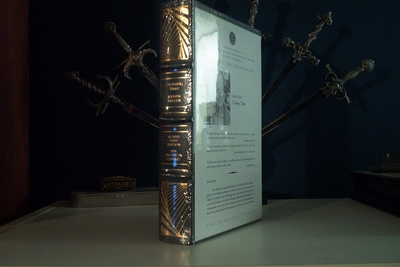Easton Press Joseph Heller books
Catch 22 - ( not signed by Joseph Heller ) - 1998Franklin Library Joseph Heller books
Good as Gold - limited first edition ( not signed ) - 1979
God Knows - signed first edition - 1984
Closing Time - signed first edition - 1994
Now and Then: From Coney Island to Here - signed first edition - 1998
Author Joseph Heller
Joseph Heller, born on May 1, 1923, in Brooklyn, New York, was an American author best known for his satirical novel Catch-22, which became a literary classic and a cultural touchstone. Heller's distinctive blend of humor, absurdity, and social commentary made him a prominent figure in American literature. Heller's early life was marked by his experiences as a bombardier during World War II. Serving in the U.S. Army Air Corps, he flew 60 combat missions in the Mediterranean theater, an experience that deeply influenced his later writing, particularly his most famous work, Catch-22.
Published in 1961, Catch-22 is a darkly comedic and antiwar novel that satirizes the bureaucratic absurdities and contradictions inherent in military and political systems. The term "Catch-22" itself has become synonymous with a no-win situation, reflecting the novel's exploration of the illogical and often absurd nature of war. Following the success of Catch-22, Heller continued to write novels, essays, and plays. Some of his other notable works include Something Happened (1974), a novel exploring the alienation of modern corporate life, and Good as Gold (1979), a satirical take on academia.
Despite the critical acclaim and success of Catch-22, Heller initially faced challenges in replicating its popularity with subsequent works. However, he remained dedicated to his craft and continued to explore themes of bureaucracy, war, and the human condition. In the later years of his career, Heller published Picture This (1998) and Closing Time (1994), a sequel to Catch-22. While these works did not achieve the same level of acclaim as his earlier masterpiece, they demonstrated Heller's ongoing commitment to using satire and humor to dissect societal issues.
Joseph Heller passed away on December 12, 1999, in East Hampton, New York. His legacy endures through the impact of Catch-22, which remains a widely studied and celebrated work in literature courses, and his contributions to the tradition of American satirical fiction. Heller's ability to blend wit and insight into his exploration of the absurdities of human existence has left an indelible mark on the world of literature.
Catch 22
Discover Joseph Heller's hilarious and tragic satire on military madness, and the tale of one man's efforts to survive it.
Set in Italy during World War II, this is the story of the incomparable, malingering bombardier, Yossarian, a hero who is furious because thousands of people he has never met are trying to kill him. But his real problem is not the enemy it is his own army, which keeps increasing the number of missions the men must fly to complete their service. Yet if Yossarian makes any attempt to excuse himself from the perilous missions he’s assigned, he’ll be in violation of Catch-22, a hilariously sinister bureaucratic rule: a man is considered insane if he willingly continues to fly dangerous combat missions, but if he makes a formal request to be removed from duty, he is proven sane and therefore ineligible to be relieved.
Catch-22 is the story of a bombardier named Yossarian who is frantic and furious because thousands of people he has never even met keep trying to kill him. Joseph Heller's bestselling novel is a hilarious and tragic satire on military madness, and the tale of one man's efforts to survive it.
Most of the events in the book occur while the fictional 256th Squadron is based on the island of Pianosa, in the Mediterranean Sea, west of Italy. The novel looks into the experiences of Yossarian and the other airmen in the camp, who attempt to maintain their sanity while fulfilling their service requirements so that they may return home.
But the enemy above is not Yossarian's problem - it is his own army intent on keeping him airborne, and the maddening 'Catch-22' that allows for no possibility of escape.
One of the funniest books ever written, Joseph Heller's masterpiece about a bomber squadron in the Second World War's Italian theater features a gallery of magnificently strange characters seething with comic energy. The malingering hero, Yossarian, is endlessly inventive in his schemes to save his skin from the horrible chances of war, and his story is studded with incidents and devices (including the Glorious Loyalty Oath Crusade and the hilariously sinister bureaucratic rule that gives the book its title) that propel the narrative in a headlong satiric rush. But the reason Catch-22 's satire never weakens and its jokes never date stems not from the comedy itself but from the savage, unerring, Swiftian indignation out of which that comedy springs. This fractured anti-epic, with all its aggrieved humanity, has given us the most enduring image we have of modern warfare.
Sixty years after its original publication, Catch-22 remains a cornerstone of American literature and one of the funniest and most celebrated books of all time. In recent years it has been named to “best novels” lists by Time, Newsweek, the Modern Library, and the London Observer.
Explosive, subversive, wild and funny, 60 plus years on the novel's strength is undiminished. Reading Joseph Heller's classic satire is nothing less than a rite of passage.
Closing Time
Thirty-three years and over ten million copies later...the classic story continues. Yossarian returns older, if not wiser to face a new foe.
In Closing Time, Joseph Heller returns to the characters of Catch-22, now coming to the end of their lives and the century, as is the entire generation that fought in World War II: Yossarian and Milo Minderbinder, the chaplain, and such newcomers as little Sammy Singer and giant Lew, all linked, in an uneasy peace and old age, fighting not the Germans this time, but The End. Closing Time deftly satirizes the realities and the myths of America in the half century since WWII: the absurdity of our politics, the decline of our society and our great cities, the greed and hypocrisy of our business and culture with the same ferocious humor as Catch-22.
An instant classic when published in 1961, Joseph Heller's Catch-22 still ranks among the funniest and most serious novels ever written about war. Now Heller has dared to write the sequel to his 10-million copy bestseller, using many of Catch-22's characters to deftly satirize the realities and the myths of America in the half century since they fought World War II.
In Closing Time, a comic masterpiece in its own right, Heller spears the inflated balloons of our national consciousness and the absurdity of our politics, the decline of society and our great cities, the greed and hypocrisy of our business and culture with the same ferocious humor that he used against the conventional view of warfare. Back again are characters familiar from Catch-22, including Yossarian and Milo Minderbinder, the chaplain, and little Sammy Singer, as they come to the end of their lives and the end of the century all linked, this time, in uneasy peace and old age...fighting not the Germans, but The End.
Outrageously funny and totally serious, and as brilliant and successful as Catch-22 itself, Closing Time is a fun-house mirror that captures, at once grotesquely and accurately, the truth about ourselves.
Closing Time is outrageously funny and totally serious, and as brilliant and successful as Catch-22 itself, a fun-house mirror that captures, at once grotesquely and accurately, the truth about ourselves. A stunning achievement; a chilling, darkly funny depiction of the moral collapse of the Western world.
Good as Gold
Bruce Gold, a middle-aged, Jewish professor of English literature, finds himself on the brink of a golden career in politics and not a moment too soon, as Gold yearns for an opportunity to transform a less-than-picture-perfect life: His children think little of him, his intimidating father endlessly bullies him, and his wife is so oblivious that she doesn't even notice he's left her. As funny as it is sad, Good as Gold is a story of children grown up, parents grown old, and friends and lovers grown apart, a story that is inimitably Heller.
On paper, Bruce Gold seems to have carved a comfortable niche for himself. But in the flesh, he's not so impressive. His ancient father thinks he's a fool, his children fail to notice him and even his wife doesn't realise he's no longer living with her. Gold's been promised a prestigious government post in Washington only he's never been told what the position actually is. Hugely funny and sweetly sad, Good as Gold is the story of children grown up, parents grown old, and lovers grown apart.
God Knows
A first person story of King David of Israel, as told in his inimitable way, by the author of Catch-22.
Joseph Heller's powerful, wonderfully funny, deeply moving novel is the story of David, yes, King David, but as you've never seen him before. You already know David as the legendary warrior king of Israel, husband of Bathsheba, and father of Solomon; now meet David as he really the cocky Jewish kid, the plagiarized poet, and the Jewish father. Listen as David tells his own story, a story both relentlessly ancient and surprisingly modern, about growing up and growing old, about men and women, and about man and God. It is quintessential Heller.
On his death bed, David, warrior-king of Israel, reflects on his life, future representations of him, and his troublesome family, while he awaits God's apology.
Now and Then - From Coney Island to Here: A Memoir
From the author of two of our most legendary novels, Catch-22 and Something Happened , comes a slyly funny, vastly revelatory memoir that is at once a loving evocation of a lost America and an exploration of the frontier where life turns into literature.
The demented Army Air Force of Catch-22 , the lethal business world of Something Happened , the dysfunctional family of Good as Gold -all these, we have assumed, had their roots in Joseph Heller's own past. Now, more than thirty-five years after the explosion of Catch-22 into the world's consciousness, Heller gives us his life.
Here is his Coney Island childhood, down the block from the world's most famous amusement park. It was the height of the Depression, it was a fatherless family, yet little Joey Heller had a terrific time on the boardwalk, in the ocean (dangerously out of his depth), playing follow-the-leader in and out of local bars, even in school. Then a series of jobs, from delivering telegrams (on his first bike) to working in a navy yard-until Pearl Harbor, the air force, Italy. And after the war, college (undreamed-of before the G.I. Bill), teaching, Madison Avenue, marriage, and-always-writing. And finally the spectacular success of Catch-22 , launching one of the great literary careers.
Now and Then follows Joseph Heller from his fatherless childhood on the boardwalks of Depression-era Coney Island, where he grew up amid the rumble of the Cyclone and the tantalizing aroma of Mrs. Shatzkin's knishes. It offers a dizzying bombardier's-eye view of the sky over wartime Italy, where Heller encountered the characters and incidents he would later translate into Catch-22. It depicts a writer coming to terms with both rejection and celebrity. Here, in short, is a life filled with incident and insight, recollected with subversive humor, exquisite timing, and a fine appreciation for the absurd.
The strengths of Now and Then lie in the energy, humor, and mischief that have characterized all of Heller's work, along with the dark undertones that lie beneath them. He brings back a Coney Island that is not only a symbol of fun and fantasy around the world but a vision of what seems today to have been a golden age of carefree innocence. For the first time, he writes about the people and the events, both tragic and hilarious, he was eventually to translate, in Catch-22 , into such memorable characters as Hungry Joe, Orr, Major de Coverley, Natel's whore, and (of course) Yossarian, and such moving and frightening scenes as the death of Snowden. Now and Then is both an account of a remarkable life and a glimpse into the creative process of a major American writer.




Comments
Post a Comment
Share your best book review and recommendation